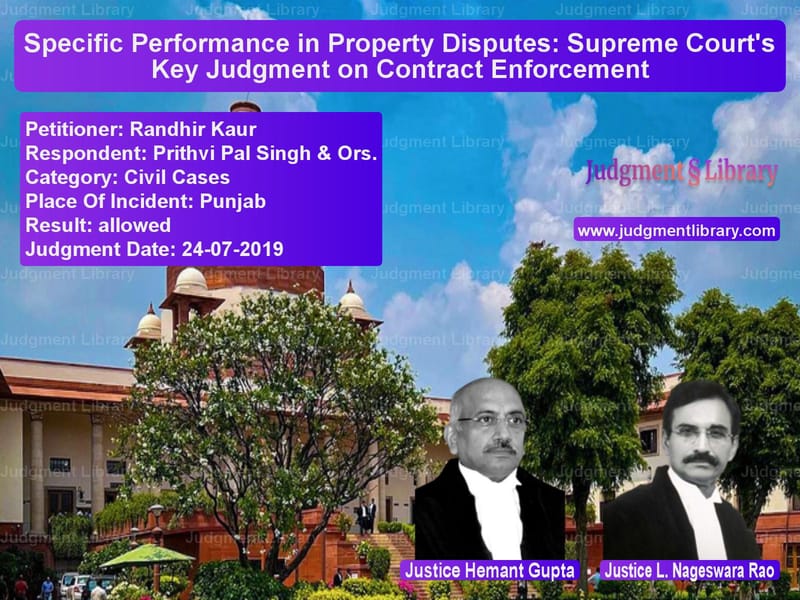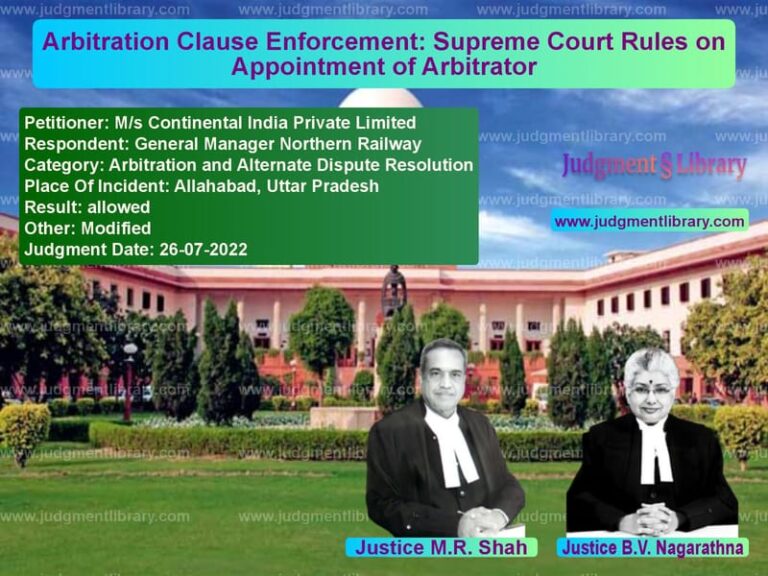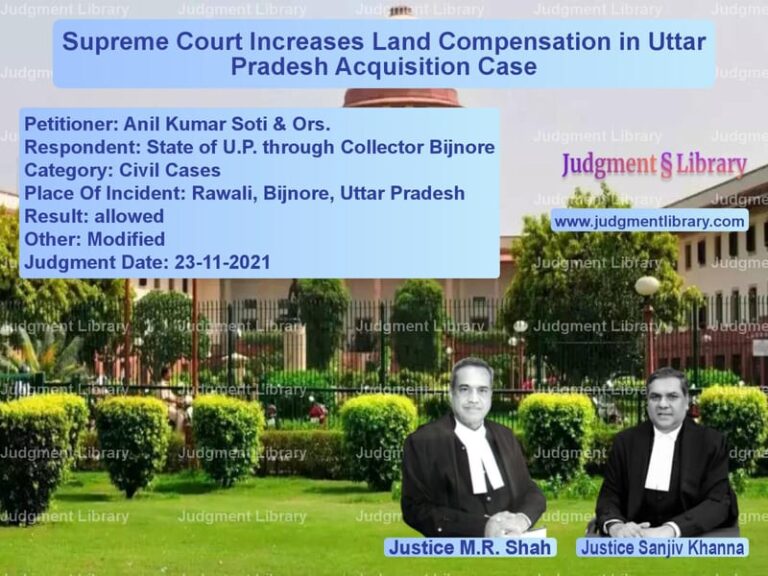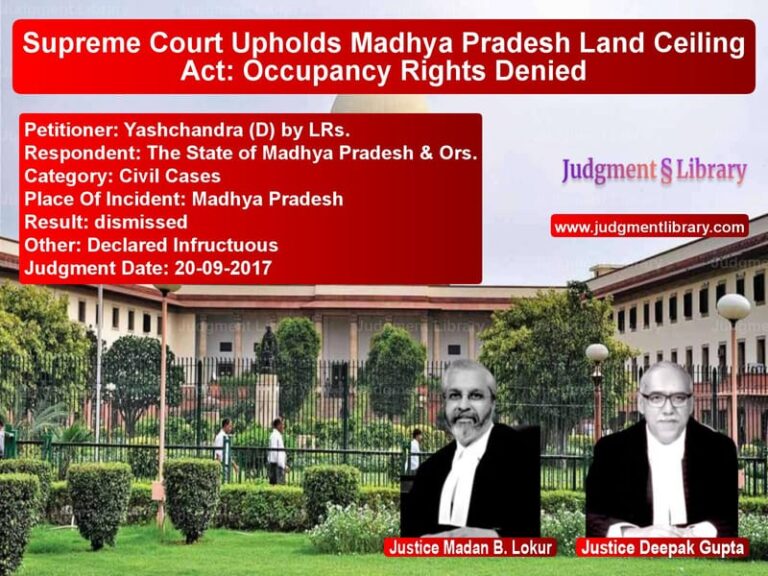Specific Performance in Property Disputes: Supreme Court’s Key Judgment on Contract Enforcement
The case of Randhir Kaur v. Prithvi Pal Singh & Ors. highlights crucial aspects of contract enforcement, specific performance, and the role of power of attorney in property transactions. The Supreme Court dealt with the legal principles surrounding the enforcement of sale agreements and the limitations on appellate courts in interfering with findings of fact.
Background of the Case
The appellant, Randhir Kaur, entered into an agreement to sell with the defendants on 5 November 2004 for land measuring 193 kanals and 18 marlas at a rate of Rs. 1,27,000 per acre. She paid an earnest money amount of Rs. 12,50,000 to the defendants. Another Rs. 1,00,000 was later paid. The sale deed registration was set for 30 January 2005. However, the sale did not materialize, leading the appellant to file a suit for specific performance on 3 April 2006.
The trial court, on 13 April 2010, decreed the suit in favor of the plaintiff. This decision was upheld by the first appellate court, which dismissed the appeal on 11 August 2012. However, in second appeal, the High Court reversed the decision, denying specific performance and instead granting a refund of Rs. 13,50,000 with 12% interest.
The High Court concluded that while the plaintiff was ready and willing to perform the contract, the power of attorney in favor of her son, Dhanwant Singh, was insufficient to authorize him to act on her behalf.
Petitioner’s Arguments
The appellant contended the following:
- The High Court erred in overturning the trial court and appellate court’s findings.
- In the case of Pankajakshi (D) through LRs & Ors. v. Chandrika & Ors., the Supreme Court held that in second appeal, factual findings cannot be interfered with unless the decision is contrary to law.
- The power of attorney dated 14 September 2005 ratified all acts of Dhanwant Singh, including property transactions on behalf of the plaintiff.
- The High Court wrongly held that Dhanwant Singh lacked authority, despite evidence that he paid Rs. 13,50,000 to the defendants.
Respondent’s Arguments
The respondents, on the other hand, argued:
- The initial power of attorney dated 29 September 1999 did not cover the disputed land.
- The power of attorney executed in 2005 only authorized future transactions, not past agreements.
- The plaintiff never informed the defendants that Dhanwant Singh was acting as her attorney.
- The High Court correctly intervened as the trial court and first appellate court based their decisions on incorrect legal conclusions.
Supreme Court’s Observations
The Supreme Court, in examining the case, reaffirmed the limited scope of interference in second appeals. It referred to several judgments, including Kirodi (since deceased) through LRs v. Ram Parkash & Ors., which held that second appellate courts cannot overturn findings of fact unless there is an error in law.
The Court noted:
- “The High Court could not interfere with findings of fact merely because it thought another view was better.”
- “Findings based on documentary and oral evidence cannot be overturned in second appeal unless they are contrary to law.”
The Supreme Court also examined the financial capacity of the plaintiff and found that she had executed two sale deeds before 30 January 2005 to arrange funds for the transaction. This reinforced the fact that she was ready and willing to complete the sale.
Final Judgment
The Supreme Court ruled in favor of the appellant, restoring the decree for specific performance. It directed:
- The appellant must pay the remaining sale consideration within two months.
- The defendants must execute the sale deed upon receiving the balance amount.
- If the defendants refuse to execute the sale deed, the appellant can deposit the amount with the executing court and seek enforcement.
Conclusion
This judgment reinforces the importance of upholding contractual obligations in property disputes. It also clarifies the limitations on appellate courts in reversing factual findings. The ruling ensures that parties who enter into agreements cannot later deny their commitments based on technical objections, thereby strengthening the principles of contract law.
Petitioner Name: Randhir Kaur.Respondent Name: Prithvi Pal Singh & Ors..Judgment By: Justice Hemant Gupta, Justice L. Nageswara Rao.Place Of Incident: Punjab.Judgment Date: 24-07-2019.
Don’t miss out on the full details! Download the complete judgment in PDF format below and gain valuable insights instantly!
Download Judgment: Randhir Kaur vs Prithvi Pal Singh & Supreme Court of India Judgment Dated 24-07-2019.pdf
Direct Downlaod Judgment: Direct downlaod this Judgment
See all petitions in Specific Performance
See all petitions in Property Disputes
See all petitions in Judgment by Hemant Gupta
See all petitions in Judgment by L. Nageswara Rao
See all petitions in allowed
See all petitions in supreme court of India judgments July 2019
See all petitions in 2019 judgments
See all posts in Civil Cases Category
See all allowed petitions in Civil Cases Category
See all Dismissed petitions in Civil Cases Category
See all partially allowed petitions in Civil Cases Category







